

Boycotting the Census. Dear Magistrate, In case the ABS is prosecuting me for non-completion of this year’s Census, I thought I should explain to you my reasons why I have decided that a boycott is the only moral position I can take.
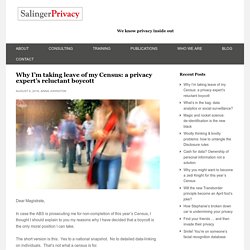
The short version is this: Yes to a national snapshot. No to detailed data-linking on individuals. That’s not what a census is for. I have wrestled with what my personal position should be. ABS 'Census Enhancement' Proposal - Privacy Impact Assessment 2005. Why I won't be filling in the census tomorrow. Dear Magistrate, In case the ABS is prosecuting me for non-completion of this year's census, I thought I should explain to you my reasons why I have decided that a boycott is the only moral position I can take.

Loaded: 0% Progress: 0% Senator's privacy protest Stand-off at juvenile detention centre Ratten family express their grief in court. Partial Victory: Obama Encryption Policy Rejects Laws Mandating Backdoors, But Leaves the Door Open for Informal Deals. Obama’s position on encryption is now public, as reported by the Washington Post.
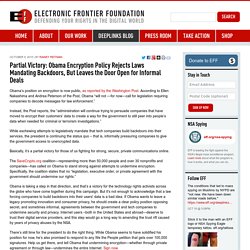
According to Ellen Nakashima and Andrea Peterson of the Post, Obama “will not —for now—call for legislation requiring companies to decode messages for law enforcement.” Instead, the Post reports, the “administration will continue trying to persuade companies that have moved to encrypt their customers’ data to create a way for the government to still peer into people’s data when needed for criminal or terrorism investigations.” While eschewing attempts to legislatively mandate that tech companies build backdoors into their services, the president is continuing the status quo – that is, informally pressuring companies to give the government access to unencrypted data. Basically, it’s a partial victory for those of us fighting for strong, secure, private communications online. #StopDataRetention. Protecting Yourself From Mandatory Data Protection To stop the government spying on your every move, you can take the steps listed below.
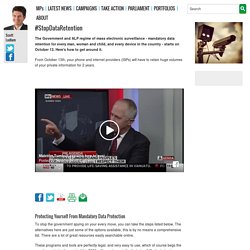
Hayden Mocks Edward Snowden's Effect on NSA Surveillance. Former National Security Agency director Michael Hayden on Monday marveled at the puny nature of the surveillance reforms put in place two years after NSA whistleblower Edward Snowden revealed a vast expansion of intrusive U.S. government surveillance at home and abroad.
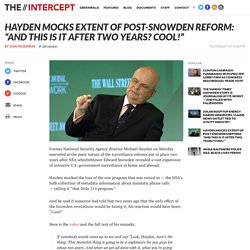
USA Freedom Act Passes: What We Celebrate, What We Mourn, and Where We Go From Here. It’s no secret that we wanted more.
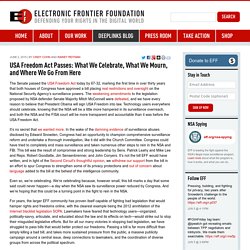
In the wake of the damning evidence of surveillance abuses disclosed by Edward Snowden, Congress had an opportunity to champion comprehensive surveillance reform and undertake a thorough investigation, like it did with the Church Committee. Congress could have tried to completely end mass surveillance and taken numerous other steps to rein in the NSA and FBI. This bill was the result of compromise and strong leadership by Sens. Patrick Leahy and Mike Lee and Reps. Robert Goodlatte, Jim Sensenbrenner, and John Conyers. Breaking: FREEDOM Act Passes Senate, Freedom Dies. By a vote of 67-32 the Senate today passed the USA FREEDOM Act, just days after the expiration of key elements of the USA PATRIOT Act.

The FREEDOM Act is billed as a reform of the unconstitutional and recently-ruled illegal bulk collection of Americans' telecommunications, but in fact it is a whole new level of attack on civil liberties. Here are just a couple of ways the FREEDOM Act is worse than the PATRIOT Act: FREEDOM Act passes, effectively kills freedom.
NSA winds down once-secret phone-records collection program. WASHINGTON (AP) — The National Security Agency has begun winding down its collection and storage of American phone records after the Senate failed to agree on a path forward to change or extend the once-secret program ahead of its expiration at the end of the month.
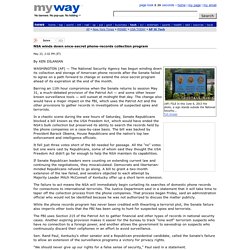
Barring an 11th hour compromise when the Senate returns to session May 31, a much-debated provision of the Patriot Act — and some other lesser known surveillance tools — will sunset at midnight that day. The change also would have a major impact on the FBI, which uses the Patriot Act and the other provisions to gather records in investigations of suspected spies and terrorists. In a chaotic scene during the wee hours of Saturday, Senate Republicans blocked a bill known as the USA Freedom Act, which would have ended the NSA's bulk collection but preserved its ability to search the records held by the phone companies on a case-by-case basis.
Despite NSA Data Collection Being Ruled Illegal, Tyrants in Congress Still Pushing Police State. Common Dreams | Nadia Prupis In the wake of Thursday’s federal court ruling that the U.S.
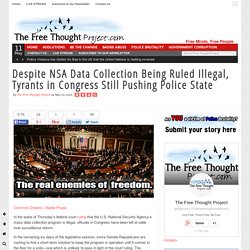
National Security Agency’s mass data collection program is illegal, officials in Congress have been left at odds over surveillance reform. Surveillance%20State%20Repeal%20Act%20114th.pdf. Illegal Spying Below: Activists Fly Anti-Surveillance Airship over NSA's Utah Data Center. The NSA just lost its budget for 'backdoor' web spying. US Congress has voted to pass a legal amendment that will cut off funding to the NSA and CIA's "backdoor" programme and prevent the spy agency from snooping on its citizens' internet communications.
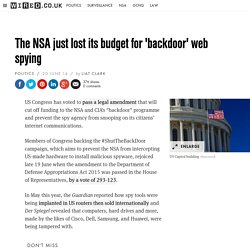
Members of Congress backing the #ShutTheBackDoor campaign, which aims to prevent the NSA from intercepting US-made hardware to install malicious spyware, rejoiced late 19 June when the amendment to the Department of Defense Appropriations Act 2015 was passed in the House of Representatives, by a vote of 293-123. In May this year, the Guardian reported how spy tools were being implanted in US routers then sold internationally and Der Spiegel revealed that computers, hard drives and more, made by the likes of Cisco, Dell, Samsung, and Huawei, were being tampered with. By no means does this vote mean the work will not continue. Last year Der Spiegel reported of the existence of a spy tool catalogue, which included gadgets costing up to $250,000 (£146,000) ready to be installed in systems. Bill Banning Assistance to NSA Passes Out of Committee in California. Michael BoldinActivist Post Citing the 10th Amendment and support from the Tenth Amendment Center (TAC), the California Assembly Public Safety Committee voted unanimously to approve a bipartisan bill which creates a mechanism to turn off all material support and assistance, including water and electricity resources, from California to federal mass surveillance programs.
The vote was 5-0. Dubbed the 4th Amendment Protection Act, Senate Bill 828 (SB828) passed the State Senate last month by a vote of 29-1, and is just two votes away from reaching Gov. Brown’s desk. If signed into law, it would ban the state from participating in, or providing material support or resources to any federal agency engaged in the “illegal and unconstitutional collection of electronic data or metadata, without consent, of any person not based on a warrant that particularly describes the person, place, and thing to be searched or seized.” Sponsored by Sen. In response, Sen. Trejo considered this positive. Statement on Passage of Massie-Lofgren Amendment Regarding NSA Backdoors.
House unexpectedly votes to stop warrantless NSA searches. Warrantless cellphone location tracking is illegal, US circuit court rules. A US Appellate Court has ruled that police must obtain a warrant before collecting cellphone location data, finding that acquiring records of what cell towers a phone connected to and when it was connected to them constitutes a Fourth Amendment search. This ruling, from the 11th Circuit, is in opposition to a ruling made nearly a year ago by a separate appellate court. While this ruling won't overturn that one because of their separate jurisdictions, it adds critical precedent to a privacy question that's still far from decided across the country.